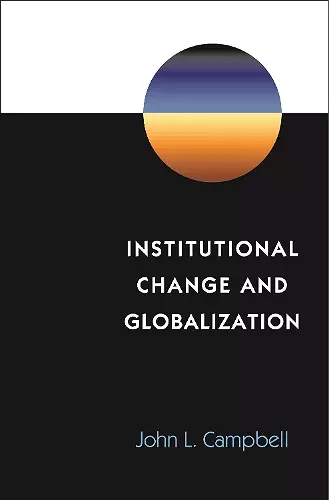Institutional Change and Globalization
Format:Paperback
Publisher:Princeton University Press
Published:31st Aug '04
Should be back in stock very soon

Professor Campbell has ably synthesized a vast amount of literature on institutions. He has highlighted common strands of thought across the literature and identified the important mechanisms by which institutions change. His synthesis is clear, well-written and well-argued. -- Neil Fligstein, University of California, Berkeley This is an impressive book: comprehensive, well-written, judicious but with a clear point of view. It joins a masterful survey of institutional arguments to a sustained dialogue with advocates of the "globalization hypothesis." Where some would expect the steady erosion of national political institutions by increasingly mobile flows of capital, Campbell argues that configurations of institutions, policies, and organized political actors are unexpectedly robust. Through an effective conversation of theory and evidence, Institutional Change and Globalization advances both the theoretical project of institutionalism and our understanding of the ongoing transformations--or not--of the modern world. -- Elisabeth S. Clemens, University of Chicago
Tells about institutional change, how to recognize it, when it occurs, and the mechanisms that cause it to happen. This book confronts several important problems in institutional analysis, and offers conceptual, methodological, and theoretical tools for resolving them.This book is about institutional change, how to recognize it, when it occurs, and the mechanisms that cause it to happen. It is the first book to identify problems with the "new institutional analysis," which has emerged as one of the dominant approaches to the study of organizations, economic and political sociology, comparative political economy, politics, and international relations. The book confronts several important problems in institutional analysis, and offers conceptual, methodological, and theoretical tools for resolving them. It argues that the paradigms of institutional analysis--rational choice, organizational, and historical institutionalism--share a set of common analytic problems. Chief among them: failure to define clearly what institutional change is; failure to specify the mechanisms responsible for institutional change; and failure to explain adequately how "ideas" other than self-interests affect institutional change. To demonstrate the utility of his tools for resolving the problems of institutional analysis, Campbell applies them to the phenomenon of globalization. In doing so, he not only corrects serious misunderstandings about globalization, but also develops a new theory of institutional change. This book advances the new institutional analysis by showing how the different paradigms can benefit from constructive dialogue and cross-fertilization.
"Professor Campbell has ably synthesized a vast amount of literature on institutions. He has highlighted common strands of thought across the literature and identified the important mechanisms by which institutions change. His synthesis is clear, well-written and well-argued." - Neil Fligstein, University of California, Berkeley; "This is an impressive book: comprehensive, well-written, judicious but with a clear point of view. It joins a masterful survey of institutional arguments to a sustained dialogue with advocates of the 'globalization hypothesis'.... Through an effective conversation of theory and evidence, Institutional Change and Globalization advances both the theoretical project of institutionalism and our understanding of the ongoing transformations - or not - of the modern world." - Elisabeth S. Clemens, University of Chicago"
ISBN: 9780691089218
Dimensions: unknown
Weight: 397g
264 pages